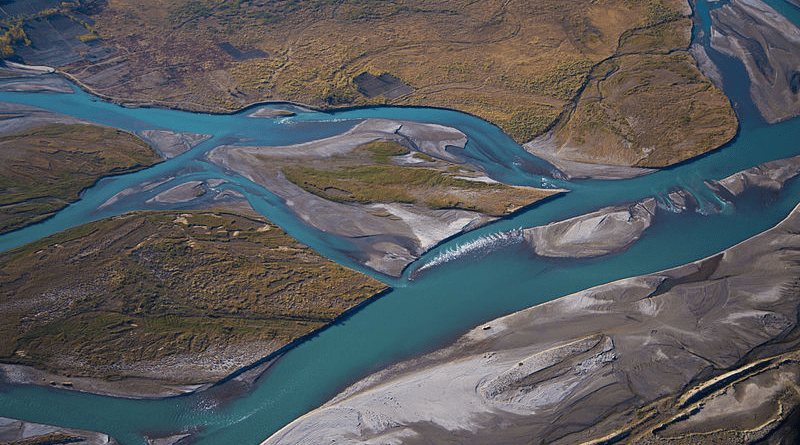Taliban: Kabul River Jugular Vein Of Pakistan – OpEd
By Patial RC
One of the major causes of the Ukraine-Russia war is also ‘Water’ which has not got its due attention from the western media. The February 24th bombing of the Kherson dam is claimed to have restored water flow through the canal to Crimea. “Russian forces restored water flow to a canal linking the Dnieper River in Ukraine to Russian-annexed Crimea”.
The US withdrawal from Afghanistan in 2021 and the formation of the new Taliban government has raised numerous concerns world over. These concerns range from the re-introduction of the Sharia law, women liberties, the potential rise of terrorism as well as a new power play of China- Pak nexus in the region.Taliban majority Pathans are known to follow Pashtunwali, “a flexible unwritten code and traditional life style.” It is an ancient system of law and governance that is still in use today, mostly in the rural and tribal areas. The codes of the Pashtunwali promotes courage, self-respect, independence, justice, hospitality, love, forgiveness, revenge, and tolerance toward all especially to strangers . However, strict adherence to Sharia law ,control on women and revenge top their agenda.
The Taliban have banned women and girls from secondary and higher education, and altered curricula to focus more on religious studies. They dictate what women must wear, how they should travel, workplace segregation by sex, and even what kind of cell phones women should have. They enforce these rules through intimidation and inspections. The Taliban regime is likely to fall due to policies which are not in the interests of the Afghan people at large.
The growing water demand, both within Afghanistan and its neighbours doesn’t receive much attention. Landlocked Afghanistan surrounded by Iran, Turkmenistan, Uzbekistan, Tajikistan, China and Pakistan, Afghanistan is rich in water resources with a geography and topography that provides significant opportunity for their use and exploitation. Traditionally, the country has experienced good rainfall in certain areas, though the recent protracted drought has led to severe shortages within the country and in the neighbourhood. All the Afghanistan’s neighbours are dependent on its water resources to a certain degree. Global warming due to an increasing concentration of greenhouse gases in the atmosphere will affect temperature and rainfall, and hence river flows and water resources. Precipitation in rivers and canals needs to be reduced. Reduced water flow of the Kabul River in future may become Taliban’s weapon against Pakistan.
The Kabul River is a 700-kilometre-long river that starts in the Sanglakh Range of the Hindu Kush mountains in Afghanistan. The Kabul River passes through the cities of Kabul and Jalalabad in Afghanistan and then flows into Khyber Pakhtunkhwa in Pakistan 25 kilometres north of the Durand Line border crossing at Torkham. Major tributaries of the Kabul River are Logar, Panjshir, Kunar, Alingar, Bara and Swat. It joins the Indus River near Attock in Pakistan. The Kabul River is a source of drinking water, irrigation, hydropower and provides livelihood to over 20 million people in Afghanistan and Pakistan. Afghanistan has continued to build dams and use the river for various activities. However, no water agreement exists between Afghanistan and Pakistan.
Over the years, Pakistan has tried to initiate talks on an agreement to share water. Pakistan and the World Bank initiated discussions on a water treaty similar to the Indus Water Treaty. However, none of these initiatives were successful as the Afghanistan government did not reciprocate. Given the current challenges posed due to climate change both Pakistan and Afghanistan are highly dependent on the Kabul River.
Why No agreement:
- Kabul’s continued refusal to accept the Durand Line between Afghanistan and Pakistan. Additionally, long-standing tensions over other land disputes and borderlines have impacted disputes over water and the Kabul River.
- Years of prolonged Afghan conflict have resulted in an unstable government that has not only failed to govern the country adequately but also build ties. Instability in both the countries has resulted in failure to reach an agreement on the Kabul River.
- Political animosity has been a prominent characteristic of Afghanistan-Pakistan relations.
- Taliban also does not recognize the Durand Line. The Afghan Taliban removed the Durand Line barbed wire fence erected by Pakistani forces in the Gushta district of Afghanistan’s Nangarhar province in 2021 and even threatened to go to war.
These differences have thus resulted in non-cooperation over the Kabul River and water has not been a major focus for governments in the past. It was only in 2014 that former President Ghani began prioritizing water management for economic growth. The Taliban have been seen to influence the ‘Mirab’, local informal and traditional water management institutions, where they have used the value of water in their favour. This is not new; certain factions within the ISIS used water as a tool and weapon to bring entire communities and villages to support them in Iraq.
Taliban’s repeateduse of water and infrastructure as a Weapon,can be expected to continue. For instance, in May 2021, the Taliban cut water to more than 800 families in the Badakhshan district during their advances in the region. Taliban during the same time period took control of Dahla Dam in Kandahar Province. And in their advances towards Herat, they attacked the Afghanistan-India Friendship Dam.
The situation is very alarming, as water conflicts may soon become main issues of discords. Global warming and climate change effects on river waters have to be understood by all to save this life line for the future. Thus the need of the hour is the multilateral approach for solving this growing controversy over the river waters, needs to be monitored carefully by all stake holders and timely remedial measures be taken to resolve. Water and its sources needs to be conserved to avoid Water Wars.

